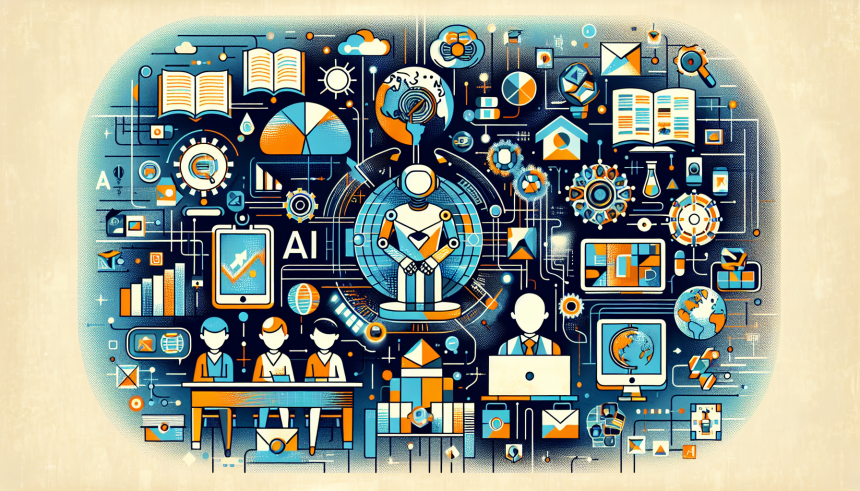AI in Education: Enhancements and Challenges Facing Learning Environments
Understanding AI in Education
Artificial Intelligence (AI) has rapidly transformed various sectors, and education is no exception. Institutions worldwide are adopting AI technologies to enhance learning experiences, streamline administrative tasks, and personalize education. This technology encompasses various applications, including adaptive learning platforms, intelligent tutoring systems, and data-driven analytics.
Enhancements Through AI
Personalized Learning Experience
One of the significant enhancements brought by AI is the ability to tailor education to individual student needs. Adaptive learning technologies leverage AI algorithms to analyze a student’s performance in real-time, adjusting the difficulty of material and pacing based on their understanding. Programs like DreamBox and Knewton exemplify this, providing customized pathways that enhance student engagement and comprehension.
Intelligent Tutoring Systems
Intelligent tutoring systems (ITS) offer students additional support outside the traditional classroom setting. These AI-powered platforms, such as Carnegie Learning and Smart Sparrow, present content and feedback tailored to individual learning styles. ITS not only provide 24/7 learning opportunities but also bridge the gap when teachers are unable to cater to every student’s needs personally.
Administrative Efficiency
AI simplifies administrative tasks, allowing educators to focus more on teaching. With AI chatbots handling routine inquiries, grading assignments, and organizing timetables, faculty and staff can allocate their time to more impactful interactions with students. Automated systems reduce workflow bottlenecks, contributing to a more efficient operational model within educational institutions.
Enhanced Engagement Through Gamification
Gamification, when integrated with AI, creates interactive and stimulating educational environments. Platforms like Kahoot! and Quizlet utilize AI to evaluate student performance and adapt game elements to maintain engagement. By embedding educational content in a game-like format, students are more likely to develop a passion for learning while attaining essential skills.
Data-Driven Insights
AI systems collect vast amounts of data regarding student performance, attendance, and engagement. This information helps educators identify areas requiring attention, which can lead to improved curriculum design and targeted interventions. With analytical tools, teachers can spot trends, tailor their approaches, and effectively allocate resources, thus fostering a data-driven educational environment.
Challenges of Implementing AI
Ethical Concerns
As AI increasingly permeates educational systems, numerous ethical issues arise, particularly concerning data privacy. The collection of personal data raises questions about student consent and data security. Institutions must ensure compliance with regulations such as FERPA and GDPR, making responsible data management a priority to safeguard student information.
Equity and Accessibility
Despite the advantages AI provides, disparities in access to technology can exacerbate existing inequalities in education. Students in underfunded schools may not have access to the same AI resources as their counterparts in well-funded districts. Bridging this digital divide is paramount, as unequal access to technology can hinder the promise of personalized learning and leave marginalized students further behind.
Dependence on Technology
Another challenge posed by AI is the risk of over-reliance on technology. While AI can enhance learning, it should not be considered a substitute for human interaction. The teacher-student relationship is critical in facilitating emotional and social development, which technology alone cannot replicate. Ensuring a balanced approach that emphasizes human connection while integrating technological advancements is essential.
Quality of AI-Driven Content
The quality of content generated or recommended by AI systems remains inconsistent across platforms. Algorithms can sometimes misinterpret or misrepresent the educational material, leading to misunderstandings or misinformation. Rigorous content validation processes must be established to ensure that the AI-curated content aligns with educational goals and standards.
Training Educators
The successful integration of AI in education heavily relies on adequately trained educators. Teachers must be equipped with the skills to use these technologies effectively, interpret data insights, and adapt their teaching methods accordingly. Ongoing professional development is critical to fostering a culture of innovation and ensuring that educators maximize the benefits of AI tools in their classrooms.
The Future of AI in Education
The landscape of AI in education is constantly evolving. As technology progresses, we may see more sophisticated AI applications, such as natural language processing and machine learning, further transforming educational experiences. Virtual classrooms powered by AI-driven platforms could enhance remote learning, while augmented reality and simulation tools may provide immersive experiences for practical learning.
Encouraging Collaboration
Collaboration between tech companies, educational institutions, and policymakers is vital to harness AI’s potential effectively. By working together, stakeholders can develop solutions that address challenges and promote equitable access to AI-driven educational benefits. These collaborative efforts can lead to innovative policies and practices that ensure a sustainable, inclusive future for AI in education.
Conclusion
AI presents a powerful opportunity to enhance educational outcomes, paving the way for personalized, engaging, and efficient learning environments. However, addressing the challenges that accompany this technology is equally important. Through a collaborative approach and a balanced emphasis on technology and human interaction, educational institutions can leverage AI to enrich the overall learning experience while promoting equity and accessibility for all students.


